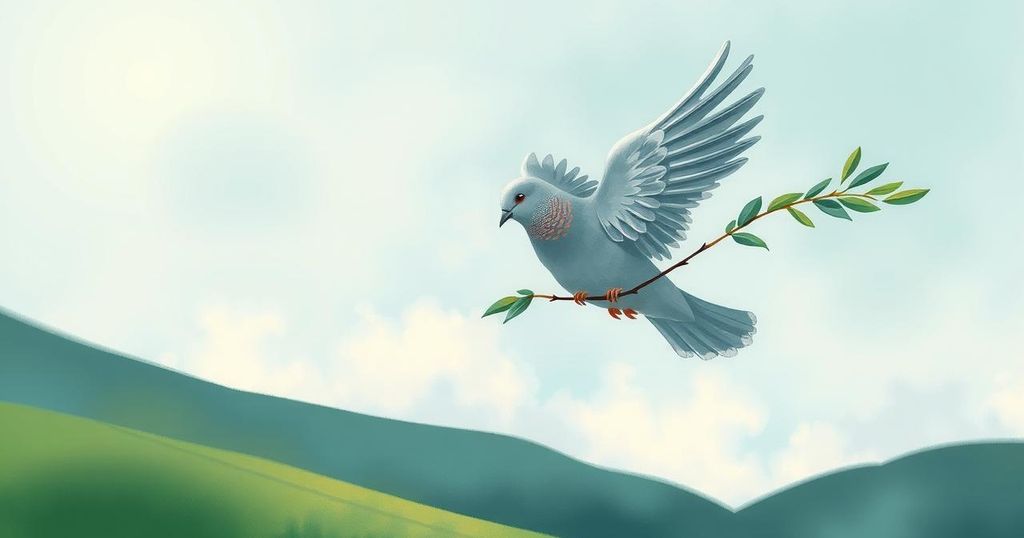Jordan supports US President Trump’s comment on Palestinians in Gaza amidst an alarming humanitarian crisis. As a rescue mission aided stranded migrants off Libya’s coast, many fleeing the Sudanese conflict shared tragic stories highlighting their unsafe journey. Reports indicate severe human rights abuses within Libyan detention centers, complicating EU policies on migration.
Jordan has expressed support for United States President Donald Trump’s recent statement regarding the Palestinian population in Gaza, emphasizing that it is not the intention to expel them. The comment was welcomed in the backdrop of ongoing discussions surrounding the Israeli-Palestinian conflict and Gaza’s humanitarian situation.
As a rescue mission was underway off the coast of Libya, a group of 70 migrants was reported to be in peril. A surveillance aircraft of the EU’s Frontex border agency alerted Humanity 1, a rescue ship operated by the German NGO SOS Humanity. Upon arrival, rescuers found individuals in distress, mainly unaccompanied minors fleeing the war in Sudan.
Among the rescued was a 17-year-old boy named Farid, who shared harrowing experiences of airstrikes and resultant atrocities from the ongoing conflict in Sudan. He reflected, “The helicopters still haunt me. Airstrike after airstrike. Dead bodies everywhere.” This sentiment illustrates the profound trauma endured by those escaping violence in their home country.
The conflict in Sudan, between the army and the paramilitary group known as the Rapid Support Forces, has resulted in significant casualties and displacement. Reports indicate that approximately 12 million individuals are displaced within the country, and humanitarian aid is severely lacking as factions reportedly misappropriate food supplies.
Farid traversed through Kufra, a region notorious for the discovery of mass graves and controlled by rival armed factions. Despite receiving basic aid, he was subjected to forced labor for no compensation, revealing the exploitation faced by many migrants. “Kufra is a tribal area. And we are slaves in their land,” he lamented, emphasizing the dire conditions.
The UN refugee agency reports there are over 210,000 Sudanese refugees in Libya, comprising around 73 percent of all refugees in the nation. Many migrants experience severe violations of rights, with women particularly vulnerable to violence. Farid recounted witnessing the brutal murder of a young girl, emphasizing the harrowing circumstances faced by those fleeing conflict.
Additionally, a fellow refugee named Ahmed described captivity in smuggler warehouses, linking the ordeal to a cycle of detention centers wherein each return incurs further fees. He characterized this disturbing journey as akin to a “small boat lottery,” underscoring the unpredictability of migrant treatment based on the fees paid.
Since 2015, the European Union has allocated significant funds directed at bolstering Libyan authorities to curb migration. However, rights groups contend that such policies have fostered abuse and failed to confront the root causes of migration. A report indicated that crimes against humanity have occurred within some detention centers financed with EU support.
While the EU maintains that no direct funding reaches Libyan authorities, it aims to enhance capabilities to rescue lives at sea while curbing human trafficking. A spokesperson noted the EU’s commitment to addressing migrant abuses and enhancing follow-up measures with Libyan authorities. Amidst mounting challenges, Ahmed concluded that he would undertake the perilous journey again, asserting, “Dying at sea is better. The sea will not torture you.”
In conclusion, Jordan has welcomed President Trump’s remarks on the Palestinian population, while refugees escaping the conflict in Sudan continue to face unimaginable hardships. Humanity 1’s mission highlights the urgent need for humanitarian aid amid escalating violence. The European Union’s funding directives and the associated allegations of human rights abuses underscore the complexities surrounding migration policy in Libya. Ultimately, the plight of these migrants emphasizes that the journey to safety can be fraught with danger and suffering, yet many are left with few options.
Original Source: www.arabnews.pk




